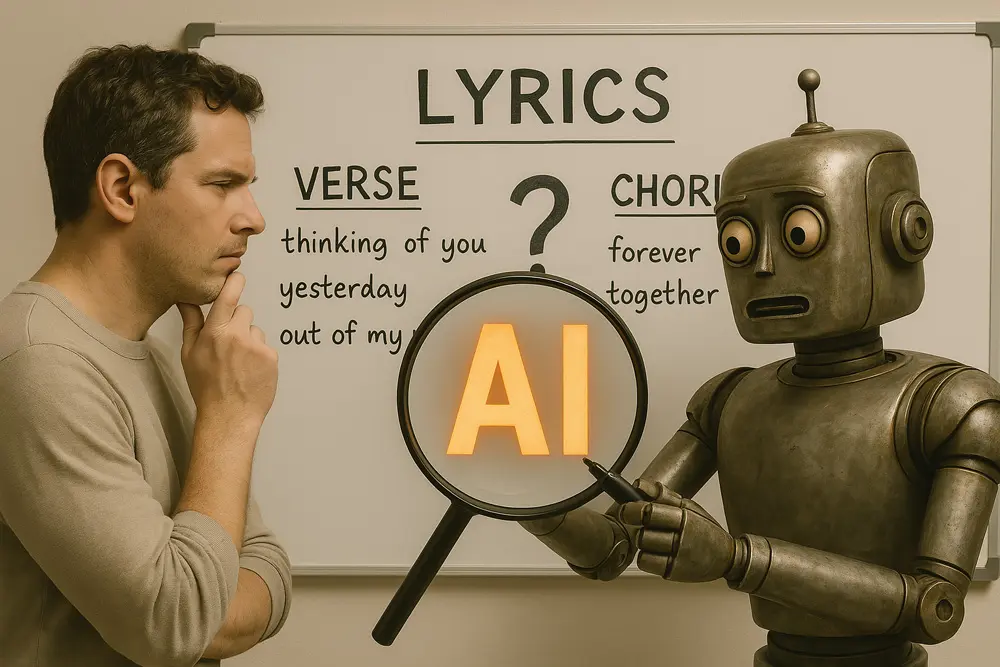Explore the best AI music tools and how to use them for songwriting without losing your unique voice and style. Get tips on songwriting with AI using ChatGPT, Suno, LyricStudio, and more.
by AiSongFix Staff | July, 25, 2025.

AI lyric generators are everywhere, but not all of them are equal, and none of them replace the heart of a human songwriter. What they can do, though, is help you spark ideas, shake off writer's block, or explore lyrical directions you might not have thought of on your own.
Whether you're just getting started or looking to refine your workflow, here are seven of the most popular AI songwriting tools, what they do best, and how to use them effectively without letting them take over your song.
📌 Pro Tip:
With whatever AI lyrics tool you use, don't settle for the first output. Professional writers and lyricist alike will tell you: "Writing is rewriting." Great lyrics, and all excellent writing, are a product of revision that turns raw ideas into polished phrases that will have emotional impact, resonate, and become lines people will quote.
Best For: Brainstorming ideas, rewriting lyrics, exploring themes, or rhymes.
Strengths: Flexibility, conversational flow, customizable outputs. Lots of ChatGPT songwriting prompts are available online.
Limitations: Requires detailed prompts and lacks music awareness.
📌 Pro Tip:
Ask for variations, not just full lyrics. Try:
"Give me five alternate opening lines for a sad country ballad about losing someone in a car accident."
Best For: Instant song drafts with audio.
Strengths: Generates both lyrics and vocalized music.
Limitations: Heavily AI-generated. Outputs can sound robotic or lack emotional depth.
📌 Pro Tip:
Use the outputs as inspiration for the mood, tone, or your lyrical premise. Then, rewrite the lyrics and re-record vocals with real performers (we can help with that; see the link at the bottom of the page).
Best For: Fast lyric generation in specific genres.
Strengths: Simple interface, genre-based outputs.
Limitations: Limited control, basic phrasing, and no music integration.
📌 Pro Tip:
Use it to overcome writer's block, but always revise the output. This one's great for rough drafts, not final cuts.
Best For: Fast, unlimited lyric generation in over 30 genres.
Strengths: Customizable mood, tone, and genre for tailored results.
Limitations: Less nuanced than pro-level tools like LyricStudio.
📌 Pro Tip:
Use the mood and genre settings to generate ideas for specific sync or pitch targets.
Best For: Line-by-line lyric writing.
Strengths: Collaborative interface, idea refinement tools.
Limitations: Subscription-based, can still produce awkward lines.
📌 Pro Tip:
Use their "expand" or "rewrite" tools when you hit a wall—but filter heavily. This tool is a great "partner," but not an editor.
Best For: Writing lyrics interactively, especially for hip-hop and rap.
Strengths: Built-in beat sync, rhyme help, and real-time community feedback.
Limitations: Best suited for rap—less applicable for traditional or country genres.
📌 Pro Tip:
Use the beat mode to test flow and delivery before exporting your lyrics elsewhere.
Best For: Rhyme-focused lyric generation with advanced flow logic.
Strengths: Ranks lines for rhyme and coherence; great for idea expansion.
Limitations: Lacks emotional tone control or genre diversity.
📌 Pro Tip:
Try mixing DeepBeat’s lines with your own to spark new lyrical directions.
Check out the AI Music Tools page of our Resources section for a list of even more AI lyric tools, non-AI lyric and music tools, other AI music tools, song generators, and much more.
Need to humanize your AI song? We can help rewrite your lyrics, melody, or track to make it ready for copyright and pitching.
Country Demo Studio 🌐↗